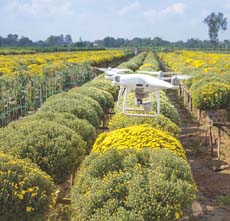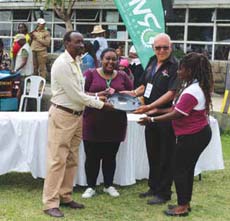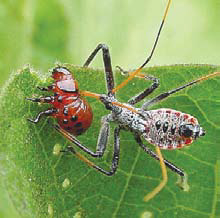By Zablon Oyugi
The Kenya, Netherlands cooperation in agriculture took a dive into Sanitary and Phytosanitary Standards (SPS) concerns raised by farmers and exporters during the recently concluded Naivasha Horticultural Fair in Nakuru County.
The initiative is a continuation of the bilateral cooperation in agriculture between Kenya and Netherlands following a bilateral cooperation in the sector the two parties signed in July this year.
According to Bart Pauwels, Agriculture Counsellor at the Embassy of the Kingdom of the Netherlands who opened the event, the role of SPS in international trade and agri-business has changed over the past decade from the technical sense to being a competitive instrument in differentiated product market hence the need to give it a proper focus.
“SPS measures are now becoming a strategic tool for developing and differentiating markets, gaining market access, coordinating the quality and safety of the food system, and defining market niches for export products.”

 Geraldine Woessner, one of the three journalists targeted by Séralini, announced on X/Twitter: “I am pleased to announce that jurisprudence has FINALLY changed: in the defamation case brought against me by Gilles-Eric Séralini, for having referred to his 2012 study on GMO-fed rats as ‘fraudulent,’ the court has just ruled in my favor. Have a great day!” She added: “My colleagues @MacLesggy and Patrick Cohen, who was also being pursued, have been acquitted.”
Geraldine Woessner, one of the three journalists targeted by Séralini, announced on X/Twitter: “I am pleased to announce that jurisprudence has FINALLY changed: in the defamation case brought against me by Gilles-Eric Séralini, for having referred to his 2012 study on GMO-fed rats as ‘fraudulent,’ the court has just ruled in my favor. Have a great day!” She added: “My colleagues @MacLesggy and Patrick Cohen, who was also being pursued, have been acquitted.” Precision Agriculture Meets Flower Farming Flower farming, like other agricultural sectors, is experiencing a transformative shift towards data-driven scouting. This approach harnesses the power of technology and data analysis to optimize various aspects of flower cultivation.
Precision Agriculture Meets Flower Farming Flower farming, like other agricultural sectors, is experiencing a transformative shift towards data-driven scouting. This approach harnesses the power of technology and data analysis to optimize various aspects of flower cultivation. Horticultural production is concentrated in regions such as the Great Rift Valley, Lake Naivasha, Mount Kenya, and Nairobi. The total horticultural area spans approximately 496,062 hectares, yielding 7.9 million metric tonnes, with roses dominating flower exports. For more than two decades, the Naivasha Horticultural Fair has been a hub of innovation, knowledge-sharing, and business networking for those involved in the cultivation of plants, herbs, flowers, fruits, and vegetables. This annual fair has grown from modest beginnings to a grand spectacle, drawing participants from across the globe to showcase their products, exchange ideas, and explore the latest advancements in the field of horticulture.
Horticultural production is concentrated in regions such as the Great Rift Valley, Lake Naivasha, Mount Kenya, and Nairobi. The total horticultural area spans approximately 496,062 hectares, yielding 7.9 million metric tonnes, with roses dominating flower exports. For more than two decades, the Naivasha Horticultural Fair has been a hub of innovation, knowledge-sharing, and business networking for those involved in the cultivation of plants, herbs, flowers, fruits, and vegetables. This annual fair has grown from modest beginnings to a grand spectacle, drawing participants from across the globe to showcase their products, exchange ideas, and explore the latest advancements in the field of horticulture. is a special year for Danziger, celebrating 70 years as a company alongside the celebration of the founder, Ernest Danziger’s 100-year birthday on November 16th.
is a special year for Danziger, celebrating 70 years as a company alongside the celebration of the founder, Ernest Danziger’s 100-year birthday on November 16th. Marketing flowers to Millennials can be challenging, particularly since they perceive them as traditional and more of a luxury purchase. However, Millennials are the largest generation in the United States, with plenty of spending power. So, how can you increase their interest in buying flowers? Here are eight ways to appeal to their values and lifestyle with your floral marketing.
Marketing flowers to Millennials can be challenging, particularly since they perceive them as traditional and more of a luxury purchase. However, Millennials are the largest generation in the United States, with plenty of spending power. So, how can you increase their interest in buying flowers? Here are eight ways to appeal to their values and lifestyle with your floral marketing.
 In the not-so-distant past, packaging was a laborious task, with boxes that were a hassle to assemble and far from eco-friendly. Reusability seemed like a distant dream. However, times have changed, and so has the world of packaging. The Hybrid Flower Box, a groundbreaking innovation from Allpack Industries, is definitely where innovation meets sustainability, and where your business meets success and it’s set to transform the way we think about packaging.
In the not-so-distant past, packaging was a laborious task, with boxes that were a hassle to assemble and far from eco-friendly. Reusability seemed like a distant dream. However, times have changed, and so has the world of packaging. The Hybrid Flower Box, a groundbreaking innovation from Allpack Industries, is definitely where innovation meets sustainability, and where your business meets success and it’s set to transform the way we think about packaging. In the heart of East Africa, Kenya has emerged as a global hub for flower production, earning the country the moniker “The Flower Basket of the World.” With its diverse climate, rich soil, and skilled workforce, Kenya’s flower industry has become a key driver of the nation’s economy. However, as the industry continues to grow, it faces various challenges, including the need to embrace sustainable practices that are environmentally friendly and economically viable.
In the heart of East Africa, Kenya has emerged as a global hub for flower production, earning the country the moniker “The Flower Basket of the World.” With its diverse climate, rich soil, and skilled workforce, Kenya’s flower industry has become a key driver of the nation’s economy. However, as the industry continues to grow, it faces various challenges, including the need to embrace sustainable practices that are environmentally friendly and economically viable. In floriculture, where growers strive to produce vibrant and healthy plants, plantparasitic nematodes can be formidable adversaries. These microscopic worms infest the roots of plants, causing damage that can lead to reduced yields and plant vitality. To combat this challenge, growers are turning to nature’s tiny warriors: beneficial nematodes.
In floriculture, where growers strive to produce vibrant and healthy plants, plantparasitic nematodes can be formidable adversaries. These microscopic worms infest the roots of plants, causing damage that can lead to reduced yields and plant vitality. To combat this challenge, growers are turning to nature’s tiny warriors: beneficial nematodes.